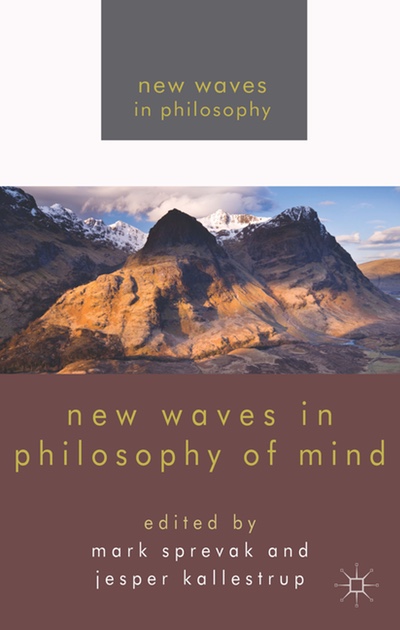New Waves in Philosophy of Mind
(with Jesper Kallestrup)
2014 Palgrave Macmillan: London, 344 pp.
Last updated 12 July 2014
This volume gives promising younger researchers in the philosophy of mind a chance to stir up new ideas. They have been asked to think afresh, to consider what the new waves might look like. The contributors offer what they take to be the right philosophical account of the topic in question, examining along the way where they think the philosophy of mind and cognition is and ought to be going. A recurrent feature is the way insights and results in neuroscience, artificial intelligence, cognitive psychology and cognate areas influence philosophical theorizing about cognition and the mind.
The volume is divided into two parts. Part 1 is devoted to topics in the metaphysics of mind. Common to most of the contributions is the question of what bearing armchair methods such as thought experiments or a priori conceptual analysis can have on the nature of meaning, mental content, phenomenal character or the physical realizability of the mental. Part 2 is more directly concerned with topics and problems at the intersection of philosophy of mind and cognitive science. A shared interest among the contributions is the question of what light empirical findings and methodologies in cognitive science can shed on explanatory practices and ontological commitments in more traditional parts of philosophy of mind. As emerges from the chapters, the division between the two parts of this volume is not intended to be a sharp one: an important recent trend blurs traditional metaphysical concerns with empirical work.
Prior to the publication of this volume we organized an online conference under the auspice of Eidyn: The Edinburgh Centre for Epistemology, Mind and Normativity. During the three weeks of The New Waves in Philosophy of Mind Online Conference, more than 500 participants registered, hundreds of posts were made in the online forums, and the conference papers were downloaded more than 3,000 times. The final volume reflects the input that authors received from this wide-ranging international scholarly community.
Contents
Part 1. Metaphysics of mind
The Cartesian argument against physicalism – Philip Goff
A call for modesty: A priori philosophy and the mind-body problem – Eric Funkhouser
Verbs and minds – Carrie Figdor
Meanings and methodologies – Justin C. Fisher
The phenomenal basis of epistemic justification – Declan Smithies
The metaphysics of mind and the multiple sources of multiple realizability – Gualtiero Piccinini and Corey J. Maley
The real trouble with armchair arguments against phenomenal externalism – Adam Pautz
Part 2. Mind and cognitive science
Problems and possibilities for empirically-informed philosophy of mind – Elizabeth Irvine
Psychological explanation, ontological commitment, and the semantic view of theories – Colin Klein
Naturalizing action theory – Bence Nanay
The architecture of higher thought – Daniel A. Weiskopf
Significance testing in neuroimagery – Edouard Machery
Lack of imagination: Individual differences in mental imagery and the significance of consciousness – Ian Phillips
A beginner’s guide to group minds – Georg Theiner
